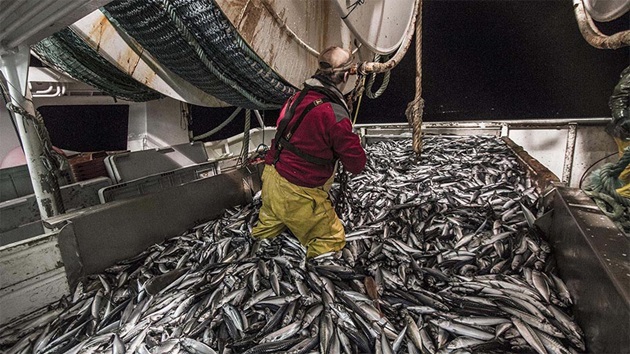The Marine Stewardship Council (MSC) is calling on coastal states and fishing nations of the North Atlantic to end their political deadlock and agree on a lasting quota sharing deal for the pelagic stocks of Atlanto-Scandian (AS) herring, blue whiting, and mackerel. The call comes after new scientific data from the International Council for the Exploration of the Sea (ICES) shows a worrying continued downward trend for stocks of AS herring and mackerel, two of Europe’s most iconic and economically important fish stocks.
Stocks of AS herring have dropped from 6.9 million tonnes in 2008 to 3.1 million tonnes today and are now below a critical sustainability threshold – the point at which the long-term health of the stock is jeopardised. Mackerel stocks have dropped from 7.26 million tonnes in 2015 to 2.8 million tonnes today and are close to their threshold.
ICES’ advice shows that the catch of Atlanto-Scandian herring, blue whiting, and mackerel in 2023 again exceeded scientifically advised limits by 33%, 28%, and 35% respectively. These limits are recommended to ensure the long-term viability of these stocks and consistently overshooting them puts the health of the ocean, economies and livelihoods at risk.
The MSC’s analysis of the data reveals that in the last seven years alone, total combined catches of Atlanto-Scandian herring, blue whiting and mackerel have exceeded the catch amount advised by scientists by 31%. This equates to just over 5.3 million tonnes of fish which, if the scientific advice had been followed, should have been left in the sea.
The most recent advice from ICES recommends a 22% reduction in mackerel catches in 2025 – resulting in a total allowed catch of 576,958 metric tonnes. In 2023, ICES had already advised a 44% reduction in catches for Atlanto-Scandian herring. However, scientists expect a larger number of young fish for the coming years, leading to a 3% increase in scientifically advised catch. But action is still urgently needed to ensure quotas are set in line with scientific advice and embedded in a long-term management plan with robust harvest strategies.
These species are fished by some of the richest nations in the world, yet governments continue to reach deadlock on agreeing a quota allocation in line with scientific advice. Instead, each nation unilaterally sets its own quotas – with the sum of these individual quotas exceeding the scientific advice. The failure to reach an agreement has resulted in year-on-year overexploitation of all three NEA pelagic stocks. There has, however, been some progress on a partial deal on mackerel between the UK, Norway and the Faroe Islands, but this needs to be expanded into a comprehensive quota sharing agreement between all relevant nations for this stock to benefit from adequate management.
Erin Priddle, Regional Director for the MSC in North Europe said: “The latest data on Atlanto-Scandian herring and mackerel shows a hugely worrying development. These species are vital to marine ecosystems, global seafood supply chains and livelihoods. Governments must not delay in securing a much-needed quota sharing agreement that aligns with scientific advice and helps secure the health of these stocks for future generations. The upcoming Coastal States meeting in October 2024 provides an important moment for the Coastal States and Fishing States of the North East Atlantic to build on recent momentum of a partial deal on mackerel, to agree a comprehensive quota sharing agreement for all three NEA pleagic stocks”.
North East Atlantic pelagic fisheries had their MSC certification suspended in 2019 and 2020 due to lack of progress on a comprehensive sharing agreement with well-defined Harvest Control Rules and Harvest Strategies between nations. The loss of certification has significantly reduced the availability of sustainable seafood for consumers. In Germany, there are no more certified mackerel products from the North East Atlantic on shelf, and the share of MSC certified sustainable herring products in retail declined from 83% in 2020 to 40% in 2024.


